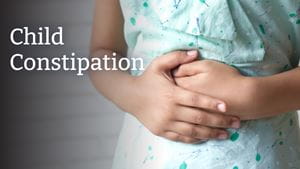
Constipation is an uncomfortable situation to deal with, regardless of whether you are an adult or a child. It happens to nearly everyone during their lifetime.
Ruvim Falkovich, MD, is a pediatrician with Rochester Regional Health and offers his advice on how to recognize potential constipation issues and how to help resolve them.
Parents should take some reassurance that constipation is common in children. It can start in infancy, and continue with toddlers and older children.
Constipation is what happens when a child is unable to pass stool through a bowel movement. It does not pertain to the frequency of bowel movements, although that can be an effect of constipation.
The end result can be either small or large bowel movements that are hard; the size does not indicate the severity of the constipation.
Infants in their early months should have frequent bowel movements; this means 7-10 stools for breast-fed babies and 1-3 stools for formula-fed babies.
As children grow older and begin to incorporate more solid foods into their diets, they should have at least 1 soft bowel movement each day.
Some symptoms or signs of constipation for children may include:
In more severe cases of constipation, vomiting or stool leakage can be an issue. These situations, however, are rare.
For infants, constipation happens more frequently with formula-fed babies, according to Dr. Falkovich.
Often, providers are uncertain about the cause or source of constipation in children.
With infants, the switch from drinking formula or breast milk to consuming whole milk can trigger gastrointestinal troubles, including constipation.
One of the more frequent reasons for constipation is a child’s diet. Children who eat a lot of cheese, bananas, rice, white bread, and baked goods are more prone to becoming constipated.
In rare cases involving infants, a condition called Hirschsprung’s disease may affect their ability to pass stool. Hirschsprung’s disease affects the large intestine and can result in problems with constipation.
Other times, the cause can be related to another milestone: the start of toilet training.
“Sometimes a child may start toilet training too soon,” Dr. Falkovich said. “As a result, the child is not ready and decides to resist and hold in their stool. This may result in constipation, as well.”
As a parent or caregiver, the last thing you want to see is your child experiencing pain or discomfort.
For more immediate relief, giving your child a laxative or stool softener may help to ease their constipation. In younger children, a gentle massage of the stomach can also be helpful.
In severe cases in which a child has not had a bowel movement in 2-3 weeks, oral medications or enemas may be used to speed up bowel movements. These cases are very infrequent, according to Dr. Falkovich.
If a child is very prone to constipation that is not corrected by dietary changes, placing them on a regimen of a stool softener or laxative and supplemental fiber may be suggested by their pediatrician. There are both over-the-counter and prescription-strength medications available as needed.
Encouraging good dietary and health behaviors can be a good way to keep your child from experiencing consistent trouble with constipation.
Eating high-fiber foods more frequently helps to keep bowel movements regular. These can include fruits, veggies, whole grains, bran, and beans. Consistent hydration is also good to incorporate into your routine.
Avoid a diet centered around processed foods, dairy, and baked goods. Excessive amounts of rice, cheese, or bananas can limit the number of bowel movements for a child.
Regular physical activity is also key to helping stimulate bowel function.
With younger children, remind them after dinner to take some time to visit the restroom. Making this a habit allows their bodies to keep a regular bowel movement schedule.
There are several different side effects that can arise when a child has trouble with bowel movements, especially as the time between them increases.
The most frequently mentioned issue related to constipation with children is abdominal pain. Others can include:
Often, parents and caregivers can use some of the previously mentioned methods of relief to help their child with constipation problems. Giving a stool softener or laxative to your child and changing their diet are the first recommended steps.
However, if there are still no bowel movements after a few days and your child is experiencing issues such as abdominal pain or discomfort, or are not eating, call your pediatrician to schedule an appointment.
“Most of the time, constipation can be resolved using relatively mild treatments at home,” Dr. Falkovich said. “But if your child is dealing with increased discomfort and goes multiple weeks without a bowel movement, call your pediatrician.”